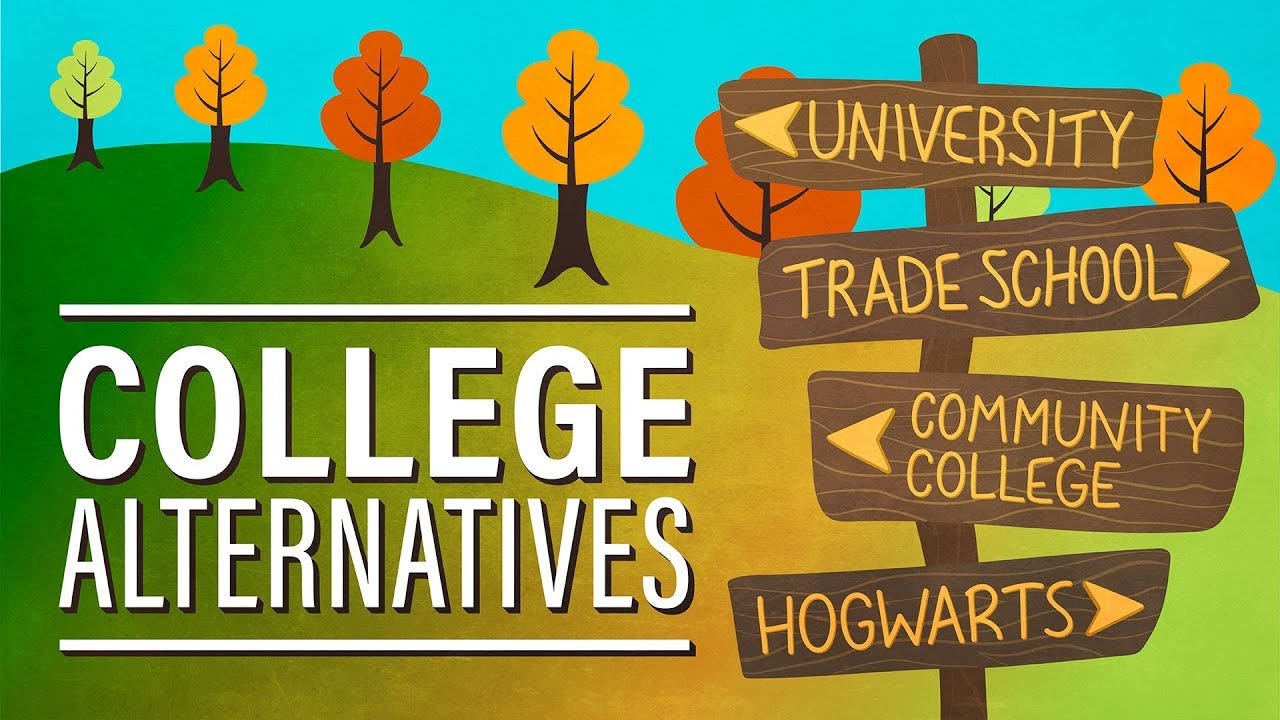The value of college varies by person, here’s a framework to consider
Every year in the US, 20M students attend college classes. That’s 8% of all adults in the US!
14M attend undergraduate courses, 4M in graduate courses, and 2M in other courses. So many college students!
This is unsurprising. Most of us are taught at a young age our goal should be to go to college and get a good job afterwards. In high school there’s emphasis on AP classes, getting good grades, clubs, sports, and test taking. And so much pressure! Many of us look back on high school as a stressful roller coaster.
Our end goal is not college or even a good job. It’s happiness. That can be found in many forms. And many paths where college isn’t the route. This article includes a framework for whether college is for you and some viable alternative paths.

A College Framework
I remember being a 17-year-old high school Junior and many of my friends’ parents had signed them up to take the SAT. I ended up signing up for the last test of the year, bought an SAT prep book from Barnes & Noble, and went to the high school basketball game the night before the big test. I stayed up late with my friends and had to print a map of where the testing facility was late that night when I got home. I took the test, thankfully got a good score, and went to college.
I honestly didn’t consider another path, such as a trade school or going straight into an occupation. It’s too bad.
As a teenager it’s perplexing to choose a path. We know some things we like and don’t like, but most don’t have the experience or network to truly decide what to do. This includes going to college.
Here’s a framework that should be helpful to anyone considering college:

Physical: Am I generally happy sitting in class?
Yes: College requires as much or more sitting per day, and generally leads to jobs where you’re more likely to sit.
No: You may want to consider a vocation that allows you to move, work with your hands, etc. Note this can be found in some college majors, such as engineering, nursing, or dance, but is generally the exception rather than the rule.
Mental: How much do I enjoy reading for class or for fun?
I Love Reading: College requires lots of reading, and generally you will work with people who also like to read.
I Don’t Love Reading: That’s fine! Think through what you’d rather be doing instead.
Financial: Am I comfortable living with little to no income for a while?
Yes: College costs money to attend, and you can usually only work part-time.
No: There are different careers you can start immediately without a college degree.
Social: How comfortable am I in large groups?
I’m fine: College often has large classes, dormitories, and events with lots of people.
I’m not fine: There are alternatives to college that typically don’t have large group settings.
While these questions are very basic, they are designed to be thought-starters for college-considerers to help them find the right fit for them.
The truth is that 20-30% of college students drop out, and while every reason is different, it shows that many students enter college without asking themselves some critical questions. I remember about half a dozen friends from my freshman year who dropped out of college their first semester. One was for financial reasons, another was an artist and felt too constrained, another wasn’t comfortable in large groups, etc. After teaching a freshman-level class as a professor I can say that a handful of students just struggled to show up and be engaged, which could have been any of the four reasons outlined in this framework.
Regardless of the situation, asking these four basic questions can lead to some important self-discovery.
What are Alternatives to Traditional College?
Here are some of the most common alternatives to a traditional college experience, and most listed here have higher starting salaries than college graduates:
Software Developer/Programmer:Programming skills are highly valued in today’s tech-driven economy. Many are self-taught or attend a bootcamp to learn specific code.
Entrepreneur/Business Owner:Entrepreneurship requires initiative, creativity, and often a willingness to take risks. Many of the world’s top entrepreneurs did not attend college.
Sales Representative:Sales representatives sell products or services to businesses or consumers. These jobs vary widely in terms of being in-office, at-home, or on the road.
Electrician, Plumber, or Mechanic:These are often overlooked and can be deeply fulfilling. You can be highly successful opening your own business and will problem solve every day.
Real Estate Agent/Broker:Real estate agents and brokers help people buy, sell, and rent properties. This can be done part- or full-time.
While this list is hardly exhaustive, it gives a taste of what other opportunities exist outside of a 4-year college degree.

I Want to Attend College. How Do I Choose Which One?
If you want to go to college there’s three main steps:
- Take a standardized test: You’ll take the ACT or SAT, you can read about the differences here. Most students take this test their Junior or Senior year in high school, although anyone can take the test anytime they want.
- Consider colleges: You’ll want to consider a number of factors, such as where the school is located, their rankings, and the size of school. One helpful factor for me was just looking at a list of companies the graduates from the business school went to after school (as I thought I would study business).
- Apply: You’ll fill out an application, which usually includes questions about you, your high school and test grades, and essays. One tip here is to make your essays stand out you should write them about a topic other students won’t (e.g., most applicants write about a trip).
The decision of what college to attend should not be taken lightly. You should apply to at least three colleges, which should include a “stretch” college. One of my regrets is not applying for an Ivy League School. Ideally when considering schools you should make an effort to talk to admissions counselors, current students, and plan a tour of the college. Oftentimes colleges may offer you an additional scholarship if they know you’re considering other schools.
There could (and should!) be a whole book written on this. We generally think you should err on the side of applying to more schools than one, exploring more states/countries than one, and talking to as many people as you can to help make your decision.
Conclusion
College isn’t for everyone. While we both went to college, we regularly counsel people and our children that the only route isn’t through a university setting. Ask yourself those four questions, consider alternatives, and if you choose college make sure it’s the right one for you!


